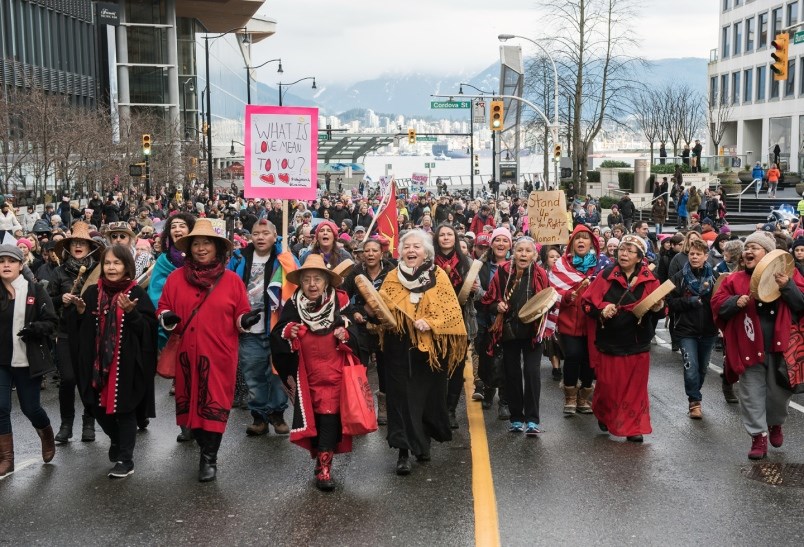Saturday’s Women’s March in Vancouver was an emotional event. When I entered Jack Poole Plaza and saw the thousands gathered there, against Vancouver’s magnificent mountains and the Olympic Cauldron, I felt a tear well up in my eye.
It was exhilarating to see a crowd of women, men and children of all ethnicities, in attire ranging from hot pink pussy hats to pastel head scarves, come together, holding up a rainbow of signs voicing their human rights concerns and solidarity against racism and misogyny.
I hadn’t expected to feel so emotional, but, after all the sexism and racism on show during the U.S. election, it was exactly what I needed. At the same time, like many in the crowd, I wondered, what’s next?
As uplifting as it was to march and watch my social media feeds fill with pictures from friends marching all over the world, I remembered how the bout of sadness that hit me after Donald Trump’s election ran deeper than his actions and statements. As a woman, a person of colour and a Muslim, it broke my heart because of how it resonated with what I see around me.
From seeing how badly Indigenous women have been treated on Vancouver’s Downtown Eastside to patiently responding to Islamophobic misconceptions from well-intentioned friends, I find the prejudices that underlie Trump’s tweets and statements hit close to home.
Confronting sexism, racism and other forms of discrimination requires more than selfies and a crowd. The challenging part is questioning our assumptions, reflecting on our privileges and figuring out what we can do about it.
This was front and centre the night before the march in Vancouver, when the local Black Lives Matter group released a statement expressing concerns it had not been contacted by the organizers of the march.
“We are pleased to see that the list of speakers includes Indigenous people and women of colour,” it said. “However, the apparent lack of Black women and trans women in both the organization and on the official speakers’ list is problematic.”
In the hours that followed, a lively debate about the statement ensued on the march’s official Facebook page. The organizers, who pulled the march together in two weeks, explained they hadn’t intended to exclude anyone. But many who commented expressed disappointment that the organizers did not immediately bring Black Lives Matter on board or apologize for the mistake. Some decided not to attend on Saturday.
By the following afternoon, a string of dozens of comments on the issue had been deleted by the administrators of the Facebook page. Another round of discussion disappeared on Sunday.
To see the debate shut down in this way was especially disheartening because the issue was not the fact that Black Lives Matter had been accidentally overlooked, but the history of feminism, of who has and hasn’t been included in the fight for women’s rights in decades past.
It’s “a more foundational question of what communities and what bodies and which experiences get actively prioritized and amplified when we articulate a vision of ‘marching for women’s rights’ in our local context,” wrote local activist Harsha Walia in a deleted comment.
And it’s about the problems that many of us don’t see or experience unless we come into contact with them directly or listen to the people who do. In fact, by opening the march with an Indigenous women who raised the ongoing challenges Canada faces with missing and murdered Aboriginal women, the organizers made an important point.
Aboriginal women are more than four times more likely to be victims of homicide than other Canadian women, and their children are twice as likely to be poor than other Canadian kids. Behind these facts is a history of colonization and discrimination, from the history of residential schools to the fact that First Nations children on reserves still receive 30 per cent less funding for their education than other Canadians.
To move forward together, we need to force ourselves to confront who we, as individuals and as a society, are choosing to prioritize, whose needs we have ignored and the ways in which our own actions might be contributing to the problem. The march was exhilarating, but the next steps should be uncomfortable and challenging.
Alia Dharssi is a freelance journalist in Vancouver who writes about immigration, women’s rights and international affairs, among other social and political issues. She is the recipient of the 2016 Michelle Lang Fellowship, and her writing has appeared in the Guardian, the National Post, VICE, the Thomson Reuters Foundation and Global BC.
@alia_d
Allen Garr is on vacation.



